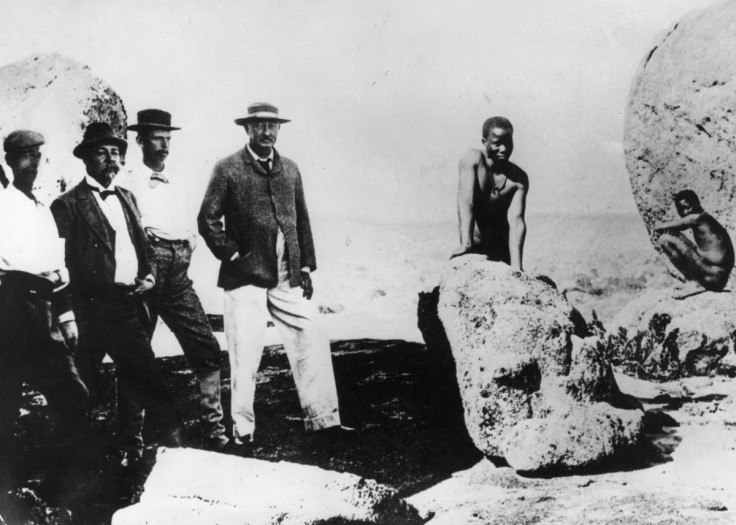Cecil Rhodes row: It's impossible for a black person to be racist towards a white one

One of the most frustrating barriers to a more just world is a shortage of basic understanding around some of society's most important issues.
Oxford University student and co-founder of Rhodes Must Fall in Oxford, Ntokozo Qwabe, was recently caught in a media firestorm, after he enthusiastically recounted on Facebook the tale of a friend, Wandile Dlamini, who eschewed tipping a white waitress at a Cape Town cafe. Instead, Dlamini left an acerbic note, declaring: "We will give tip when you return the land."
This left the waitress, Ashleigh Schultz, tearful. In his Facebook post, Qwabe wrote that she cried "typical white tears".
Qwabe said: "The time has come when no white person will be absolved... we want the stolen land back. No white person will be out there living their best life when we are out here being a landless and dispossessed black mass. It is irrelevant whether you personally have land/wealth... Go to your fellow white people & mobilise for them to give us the land back."
The subsequent reaction has been largely scathing of Qwabe and Dlamini, and solicitous towards Schultz, with a crowdfunding campaign for her raising roughly £2,000.
On the GoFundMe page, it states: "Not only has this impacted this one girl but it has encouraged people all over South Africa to follow suit and ask their servers for "LAND". If you are able to please consider giving a dollar or two to show this girl that not all people are terrible..."
In and of itself, there's little wrong with such a response, and it's heartening to read that Schultz is using the money to move closer to her ill mother. But what has proven disconcerting is the tonality and vigour of the outrage directed towards Qwabe and Dlamini.
One of the most rudimentary facets of racism is that it is prejudice + power. It's not possible for a black person to be racist towards a white person, due to an absence of socially ingrained power
Our discourse often functions on a superficial level, where individual actions are seen to supersede wider societal structures. Which means I have to first speak about the individuals before we can move on.
I found Qwabe's and Dlamini's actions distasteful (Qwabe has also been condemned by the African National Congress), but I take issue with the consensus response proclaiming this as a clear instance of racism. Sihle Ngobese, who started the aforementioned crowdfund said: "When we see racism, let's call it out, whoever it comes from."
Remember what I said about basic understanding? This shouldn't need explaining, but one of the most rudimentary and critical facets of racism is that it is prejudice + power. It's not possible for a black person to be racist towards a white person, due to an absence of socially ingrained power. By the same token, a woman can't be sexist towards a man. Discrimination is possible, and one could definitely assert that occurred in this instance. But discrimination isn't an automatic synonym for racism.
This requital is what happens when our collective understanding of the world is so dissociated from history. My favourite précis on racism comes from Mychal Denzel Smith: "Ultimately, racism is a system of oppression that has disproportionately benefited those classified as "white" and regards others as second-class citizens. For a policy/thought/action/statement to be racist, it has to reinforce that second-class status."
What Qwabe and Dlamini did wasn't nugatory, but if you're going to chide them, at least know what you're chiding them for. To quote Jon Stewart - showing that a basic grasp of racism can be understood by whites - "We have made enormous progress in teaching everyone that racism is bad. Where we seem to have dropped the ball... is in teaching people what racism actually is."
Another warning klaxon is how numerous outlets have explicitly mentioned that Qwabe and Dlamini are part of the #RhodesMustFall movement, and a petition has even surfaced demanding Qwabe's scholarship at Oxford be revoked (a petition which currently has over 30,000 signatures), with him being erroneously depicted as a talisman for a crusade of hate that is expressly anti-white.

And this is where we have a problem. Because when this affair is misrepresented as racism, and extrapolated to discredit the entire Rhodes Must Fall movement, I become sceptical as to how much genuine concern there is for Schultz and for combating racism. Is a significant segment of the outrage motivated by pure opportunism? A chance to put the "social justice warriors" in their place?
We must also consider the outpouring of kindness aimed towards Schultz. Pearl Boshomane brilliantly identified that affording compassion is often dependent on the identity of the wronged: "Remind me again how much money was raised for the black workers at University of Free State who were tricked into eating urine-soaked food on camera by a group of white students?" she observed.
One's desire to eradicate racism shouldn't be contingent on black people acting nice. It's possible to feel sympathy for Schultz without prioritising it over systemic injustice
The judgement of two people's curt behaviour has turned into a proxy battle for how we comprehend racism. While it's right to acknowledge Schultz's pain, it should also be noted that Qwabe's and Dlamini's conduct was unpleasant, but not inexplicable. What they did derives from a place of trauma, a trauma that anyone who's ever suffered from racism can relate to.
It's a trauma that has a strong connection to Cecil Rhodes. The ethos he embodied was one of history's most abhorrent, far more inimical than anything done by Qwabe and Dlamini. Attempts to change the prism we view Rhodes through isn't rewriting history. Quite the opposite. Its purpose is to get us to remember history. All of it. Not just the parts that were written by the ostensible winners.
The entire reason for Rhodes Must Fall is to make a more just world, and its aims should override the misguided folly of two activists.
One's desire to eradicate racism shouldn't be contingent on black people acting nice. It's possible to feel sympathy for Schultz without prioritising it over systemic injustice. If you have greater concern for a waitress who was treated shabbily than an entire structure that decrees people of colour as "less than", I have to question if you view racism as a problem at all.
Shane Thomas is a contributor to Media Diversified
© Copyright IBTimes 2025. All rights reserved.




















